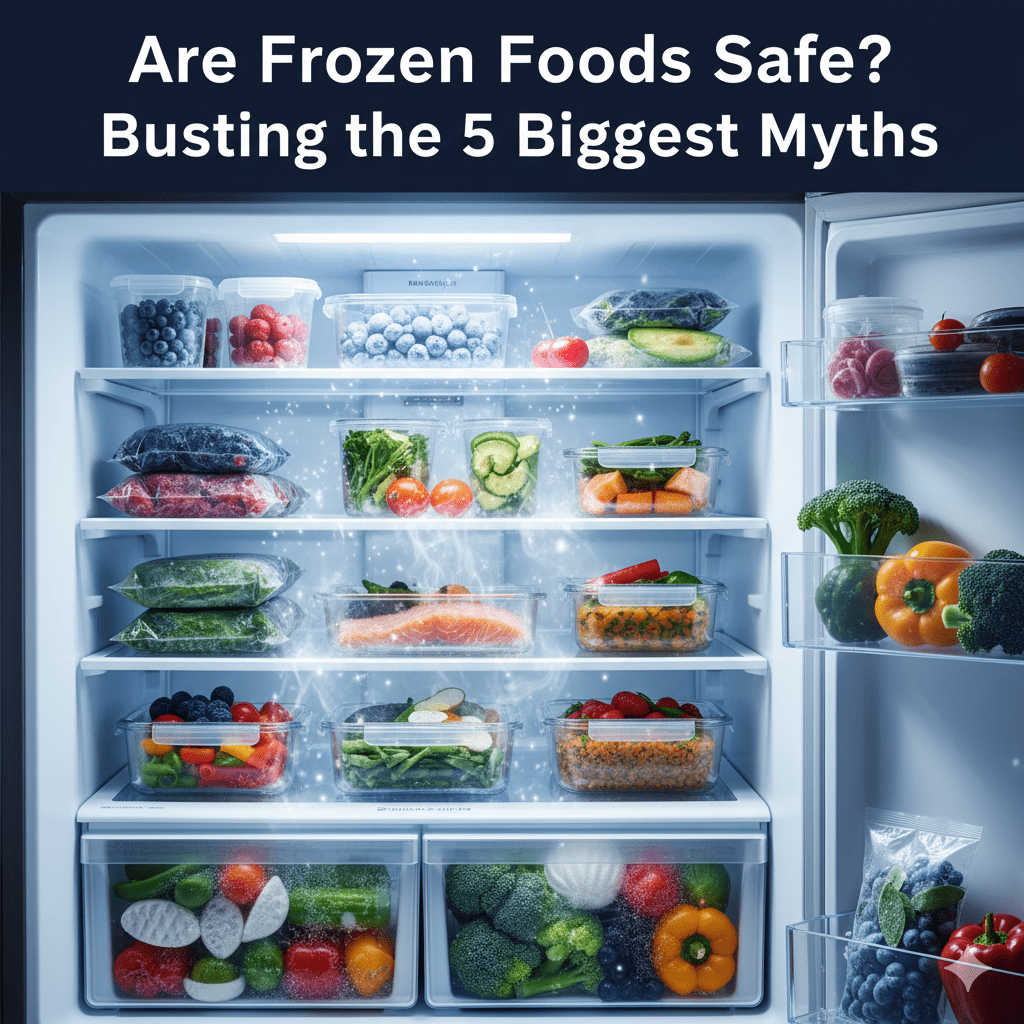For many years, frozen foods have carried a mixed reputation. Some people think they’re unhealthy, overly processed, or full of preservatives. Others rely on them daily for their convenience and freshness. The truth lies somewhere in between and it’s time to set the record straight.
With busy lifestyles and modern technology, frozen foods have become a staple in households around the world, including Pakistan. But are they really safe? Let’s clear up the confusion and bust the 5 biggest myths about frozen foods.
Myth #1: Frozen Foods Are Unhealthy
One of the most common beliefs about frozen foods is that they are unhealthy. Many assume that freezing removes nutrients or that only low-quality food is frozen.
Fact: Freezing actually helps preserve nutrients.
When food is frozen quickly after harvesting or cooking, it locks in vitamins, minerals, and natural flavors. In many cases, frozen vegetables and fruits can have more nutrients than “fresh” ones that have been sitting for days in storage or transport.
For example, peas, spinach, or corn are often frozen within hours of being picked, which helps retain their nutritional value. On the other hand, fresh produce may lose vitamins as it sits on supermarket shelves.
Bottom line: Frozen foods are just as nutritious and sometimes even more nutritious than fresh options.
Myth #2: Freezing Requires Harmful Preservatives
Many people assume that frozen foods are filled with chemicals and preservatives to keep them fresh.
Fact: Freezing is a natural preservation method that does not require chemicals.
When food is frozen, the cold temperature slows down bacterial growth and enzyme activity that cause spoilage. This means there’s no need for artificial preservatives.
Most frozen food companies, including many in Pakistan, focus on maintaining hygiene, temperature control, and packaging standards to ensure freshness without additives.
Next time you buy frozen food, check the label you’ll likely find only the main ingredients, seasoning, and little else.
Myth #3: Frozen Food Tastes Bad
Another misconception is that frozen foods lack flavor or texture compared to fresh ones.
Fact: Modern freezing techniques keep taste and texture intact.
Today, food companies use advanced quick-freeze methods such as IQF (Individually Quick Frozen) technology, which freezes food items in minutes. This process prevents the formation of large ice crystals that can damage cell structures.
As a result, the food retains its original texture and taste when thawed or cooked. So, whether it’s frozen kebabs, parathas, or nuggets, you can enjoy the same taste and crispiness as fresh-made dishes just with less effort and time.
Myth #4: Frozen Food Isn’t Fresh
Many believe that “frozen” automatically means “old.”
Fact: Freezing locks in freshness at its peak.
When food is frozen immediately after preparation or harvesting, it captures the best moment of freshness. Think of it like hitting a pause button the food stays in the same state until you’re ready to eat it.
For instance, frozen chicken or seafood is often processed and frozen within hours of being caught or cut. That means the freshness you enjoy later is often superior to items that have traveled long distances unfrozen.
Moreover, frozen foods maintain safety and quality much longer than refrigerated products, which can spoil within a few days.
Myth #5: Frozen Foods Aren’t Safe to Eat
Some people still fear that frozen food isn’t safe or hygienic.
Fact: When stored and cooked properly, frozen foods are completely safe.
In fact, freezing is one of the safest ways to preserve food. It prevents bacteria, mold, and yeast from growing. As long as the food remains at a constant freezing temperature (usually below -18°C), it stays safe to eat.
The real key is how you handle it after purchase. Always keep frozen foods cold, follow storage instructions, and avoid refreezing thawed items. Proper cooking also ensures all potential bacteria are destroyed.
Food safety authorities worldwide, including the FDA and WHO, confirm that frozen foods are safe when processed and handled correctly.
Benefits of Choosing Frozen Foods
Now that the myths are busted, let’s highlight why frozen foods are becoming a favorite in many Pakistani homes:
- Convenience: Perfect for busy schedules ready to cook in minutes.
- Less Waste: You only cook what you need; the rest stays fresh in the freezer.
- Year-Round Availability: Enjoy seasonal fruits, vegetables, or meals anytime.
- Consistent Quality: No worries about sudden spoilage or limited shelf life.
- Budget-Friendly: Often cheaper than eating out or buying fresh food daily.
Frozen foods are ideal for modern families who want to eat well without spending hours in the kitchen.
Tips for Safe Handling of Frozen Foods
To enjoy frozen foods safely and maintain their quality, keep these tips in mind:
- Always read the package instructions before cooking.
- Store at -18°C or lower to prevent bacterial growth.
- Avoid thawing at room temperature, use a refrigerator or microwave instead.
- Never refreeze thawed food unless it has been cooked.
- Check the expiry date before purchasing.
By following these simple guidelines, you can ensure your frozen meals remain safe, tasty, and nutritious.
Final Thoughts
Frozen foods are not the “unhealthy” or “unsafe” options they were once believed to be. In fact, with advancements in freezing technology, improved hygiene standards, and better packaging, frozen foods have become a smart and safe choice for modern households.
They help you save time, reduce waste, and still enjoy delicious, nutritious meals every day.
If you’re in Pakistan and want to try frozen meals that combine quality with taste, explore Orange Foods Expert, a brand dedicated to providing the best frozen foods in Pakistan, ensuring every bite is fresh, safe, and full of flavor.
